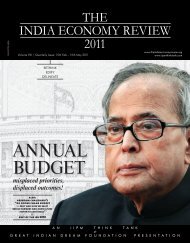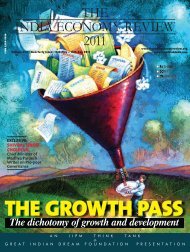Download - The India Economy Review
Download - The India Economy Review
Download - The India Economy Review
You also want an ePaper? Increase the reach of your titles
YUMPU automatically turns print PDFs into web optimized ePapers that Google loves.
crises. This note contends that the best<br />
form of economic planning avoids either<br />
extreme corner.<br />
Economic planning has been considered<br />
important in <strong>India</strong> at least ever since<br />
independence. We have had a number of<br />
fi ve year plans over the last sixty plus<br />
years. <strong>India</strong> has made remarkable<br />
progress in this period with especially<br />
rapid progress since the deregulatory<br />
moves of the early 1990s. Nevertheless,<br />
the role played by economic planning can<br />
be and is being vigorously debated in In-<br />
dia. Indeed, national industrial policy<br />
remains controversial globally.<br />
Even in corporations and other organizations,<br />
where strategic and operational<br />
planning is widely adopted, smart executives<br />
recognize the limitations of such<br />
exercises. While planning allows an or-<br />
I NTEGRATED PLANNING<br />
ganization to prepare its responses to<br />
events and environmental changes, it<br />
limits fl exibility and nimbleness – two<br />
qualities that become critical in environments<br />
that change rapidly. Business planning<br />
seems to work best in a static or slow<br />
moving environment. It seems the same<br />
may be true for nations.<br />
<strong>The</strong> year 1989 seems to have been a<br />
turning point for economic planning.<br />
That year saw the break-up of the<br />
Berlin Wall, a symbolic affi rmation of<br />
the fall of communism. 1 It was also the<br />
year the remarkable growth of the Japanese<br />
economy peaked. <strong>The</strong> communist<br />
countries and Japan were both known to<br />
have built their considerable economic<br />
successes with heavy reliance on national<br />
economic planning and industrial policy<br />
(Aggarwal, 1999a). After 1989 most of<br />
these centrally planned countries started<br />
converting their economies to rely much<br />
more on market signals to guide economic<br />
growth. Similarly, other countries<br />
that already had market-based economies<br />
started down a similar path with a strong<br />
focus on de-regulation. Interestingly, this<br />
global move towards less reliance on national<br />
economic planning and regulation<br />
lasted for about two decades until the<br />
developed country fi nancial crises of<br />
2008-09. Over-reliance on free<br />
markets and too little regulation<br />
seems to have<br />
THE INDIA ECONOMY REVIEW<br />
23





